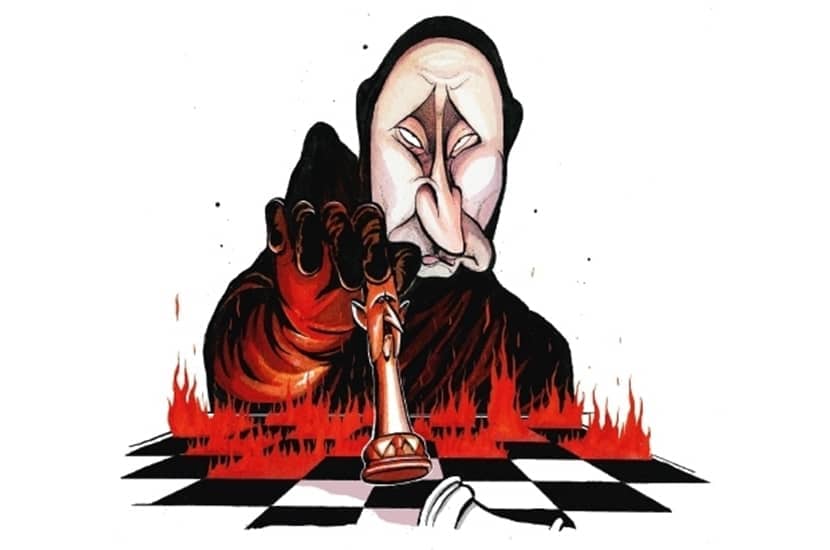Much attention has been paid to how Vladimir Putin has learnt from western weakness over his earlier invasions, including into parts of Ukraine; less to what he has learnt from Syria. He discovered that the West did not have the stomach for intervention there, and found that his own country did. He re-established Russian power in the region, including the power to influence both sides. He seems also to have learnt from his success in backing Assad that extreme brutality is effective. After much initial outrage, the West forgot about its indignation, handing victory to the Assad regime. Putin probably believes the same will happen over Ukraine. Although western anguish in this case surely runs deeper than it did over Syria, Putin might be right. His nuclear threats help compel acceptance of his totally unjustified claim that he is entitled to invade Ukraine, whereas any western military response is an act of war. We hold back, he advances. He may believe fully in the terrorist mentality: he may simply feel that if he kills far more people, we will flinch and he will win.
Meanwhile, China picks its words very carefully. China Daily describes the United States and Nato as ‘the instigators and fuellers of the crisis’ but says nothing warm about Russia. It even hints at reproof by complaining of nuclear weapons being ‘bandied about’ and professing to be ‘extremely concerned’ about civilian casualties. The foreign minister, Wang Yi, says that ‘Ukraine should function as a bridge between the East and the West’. The EU (which China carefully treats more sympathetically than it does the US) should have an ‘equal-footed dialogue’ with Russia. China is trying to place itself as the honest broker on behalf of ‘the international community’ (a phrase it uses a lot), although the actual policies it supports would benefit Putin’s Russia, damage the West and humiliate Ukraine. That Ukrainian ‘bridge’ would be tramped over by Russians and, where needed, Chinese; never by westerners. At the same time, China bonds with Russia over wider suppressions of dissent. In January, I noticed a friendly item in China Daily headlined ‘Russian peacekeepers return home’. It reported that 19 military planes of these saints had flown back to Moscow having ‘successfully accomplished’ a mission in Kazakhstan. It was the first operation of its kind by the Collective Security Treaty Organisation, Putin’s mini-Nato. China carefully avoids any specific endorsement of a Putin aggression, however. If he is disgraced, China’s support for him will be deniable. Perhaps Xi Jinping will get the Nobel peace prize.
Russia also uses deniability. As well as the conventional – indeed, rather old-fashioned – tactics of massed artillery, it combines the work of the Spetsnaz with that of the Wagner Group, the private military company which is an informal arm of the Russian state. Another Russian private military company is RSB Group, originally established by former officers of the GRU (Russian military intelligence). It is said to be operating in Kiev. Interesting to note that, in order to carry out its operations in Libya, the group has a subsidiary company called RSB Group Ltd, incorporated in the Isle of Man. I hope HMG is having a look at it.
The latest IPCC report concludes: ‘Any further delay in concerted anticipatory global action on adaptation and mitigation will miss a brief and rapidly closing window of opportunity to secure a liveable and sustainable future for all.’ In order to work out how bad this risk is, it would help to know how rapidly that ‘window’ is closing. Since the invasion of Ukraine, we urgently need to understand priorities. When Britain declared a climate ‘emergency’ some years ago, was ‘emergency’ an accurate word, or just a piece of rhetoric to obtain more funding and pass more laws? Since last week, the West – indeed the world – faces a visible, alarming emergency in the exact sense of the word. Do we persist with net zero as if nothing has happened? Olaf Scholz, the newish Chancellor of Germany, thinks not. In his remarkably bold speech to the Bundestag on Sunday, which announced German rearmament, he also said: ‘The events of recent days and weeks have shown us that responsible, forward-looking energy policy is not just crucial for our economy and our climate. It is also crucial for our security.’ This is a key admission, because it counteracts the orthodoxy that net zero must carry all before it. Scholz now talks of ‘building up a reserve of coal and gas’ and ‘the decision to rapidly build two LNG terminals in Brunsbüttel and Wilhelmshaven’. What he calls ‘the peaceful order in Europe and the world’ comes first. If a left-wing German goody-goody can say this so clearly, what is holding Boris Johnson back from an energy policy which can make Britain secure once again?
I have been rather slow to recognise the importance of Putin’s age in all of this. Perhaps this is because, unlike the Soviet gerontocracy pre-Gorbachev, he takes full advantage of modern western skill in plastic surgery and (perhaps) sophisticated drug regimes. Although these make him look extremely weird, they do also make him seem younger than Brezhnev, Andropov and Chernenko. All of these looked quite definitely old, and poor Chernenko could barely speak, breathe or walk. Yet Putin is only four years younger than Brezhnev when he invaded Afghanistan, three years younger than Chernenko when he gained supreme power and actually older than Andropov when he took over in 1982. It was quite late in life to try to start a potentially global conflict.
In 1992, the year after the end of the Soviet Union, there were round about 5.5 roubles to the US dollar. As I write, the figure is just under 100. In its rough and ready manner, the capitalist system does have ways of telling the truth.







Comments